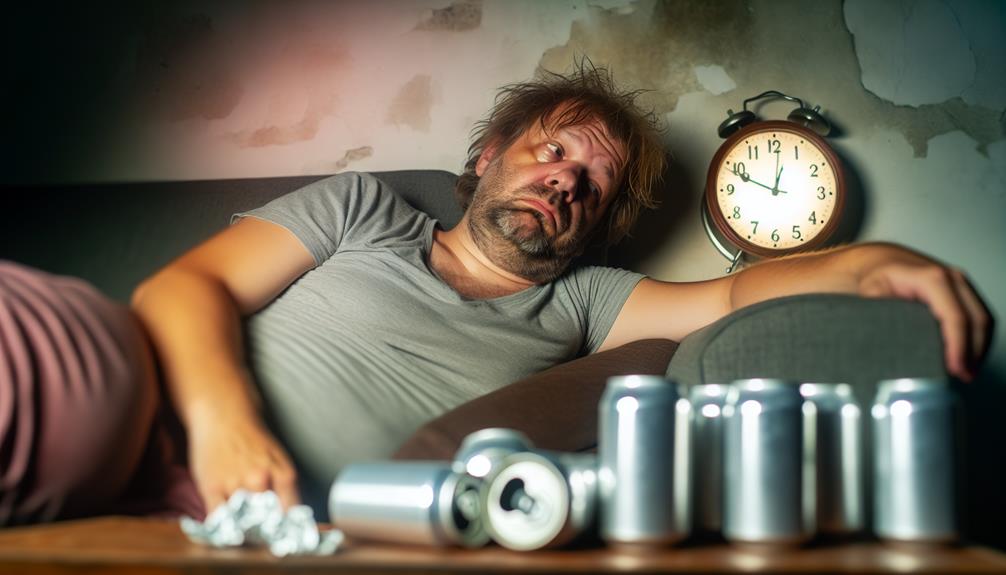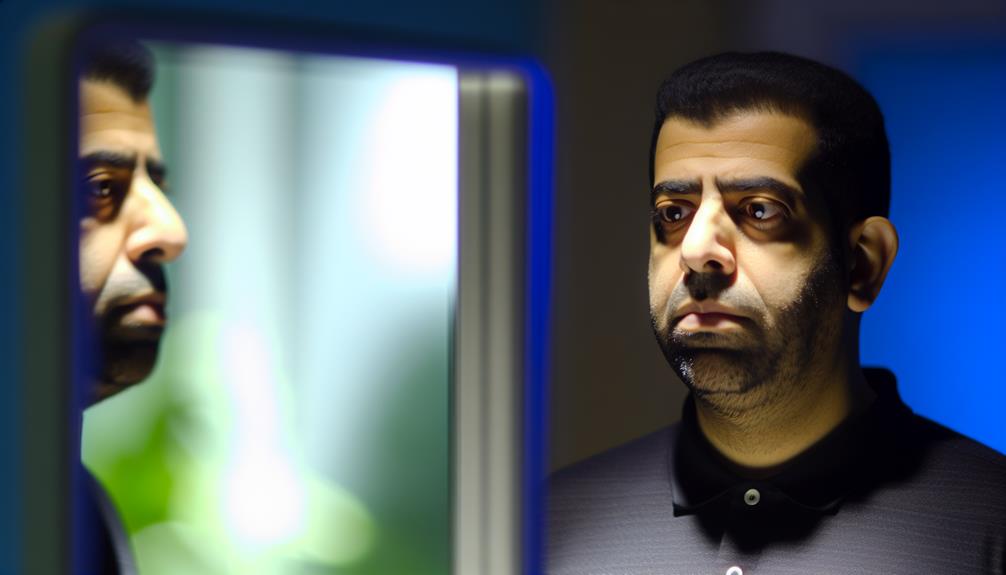If you're noticing symptoms like persistent fatigue, mood swings, decreased libido, and weight gain, you might be experiencing a hormonal imbalance. Low testosterone can lead to erectile dysfunction, while elevated cortisol levels can contribute to weight issues and emotional instability. Increased body hair and memory problems, such as difficulty concentrating, are also common. Additionally, gynecomastia and skin changes might occur as a result of hormonal fluctuations. Identifying these symptoms early is essential for effective management and treatment. Understanding the underlying factors can provide vital insights into your health and well-being. There's more to explore about this topic.
Fatigue and Low Energy

Over time, many men may notice an unsettling trend: persistent fatigue and low energy levels that seem disproportionate to their daily activities. This phenomenon often stems from hormonal imbalances, particularly involving testosterone, which plays a fundamental role in regulating energy levels. When testosterone declines, it can lead to a considerable reduction in overall vigor, making even routine tasks feel intimidating.
In my experience, understanding the relationship between hormonal fluctuations and fatigue is essential for effective fatigue management. Low testosterone levels are frequently associated with symptoms such as decreased stamina, increased sleep disturbances, and an overall sense of lethargy. These symptoms not only affect physical performance but also contribute to impaired cognitive function, further exacerbating feelings of exhaustion.
To address this issue, I recommend a multifaceted approach. First, it's important to consult a healthcare professional for thorough hormonal testing. This step can help identify specific hormonal deficiencies that may be contributing to low energy levels. Once diagnosed, potential treatment options, including lifestyle modifications, dietary adjustments, and hormone replacement therapy, can be explored.
Additionally, incorporating regular exercise and proper sleep hygiene can greatly enhance fatigue management. Engaging in physical activity boosts testosterone levels naturally and promotes better overall energy balance. By taking these proactive measures, it's possible to mitigate the impacts of fatigue and reclaim a sense of vigor, leading to improved quality of life and enhanced daily performance.
Mood Swings
I've noticed that mood swings can often stem from hormonal imbalances, particularly fluctuations in testosterone and cortisol levels. These mood changes can greatly impact daily life, affecting relationships, work performance, and overall emotional stability. Understanding the causes and consequences of these swings is essential for addressing the underlying hormonal issues.
Causes of Mood Swings
Experiencing mood swings can often be linked to various underlying causes, particularly hormonal imbalances in men. As I explore this topic, it's essential to understand how hormonal fluctuations can disrupt emotional regulation, leading to significant mood variations.
Here's a concise overview of some common causes of mood swings:
| Cause | Description | Effect on Mood |
|---|---|---|
| Testosterone Levels | Low testosterone can lead to irritability and depression. | Increased mood instability |
| Cortisol Levels | Elevated cortisol due to stress can cause anxiety and fatigue. | Heightened emotional reactivity |
| Thyroid Function | An underactive thyroid can result in lethargy and sadness. | Diminished emotional resilience |
These factors illustrate how hormonal fluctuations can play a vital role in shaping emotional responses. When hormones are out of balance, it can create a ripple effect on emotional regulation, leading to unpredictable mood swings. Understanding these causes empowers us to seek targeted solutions, addressing the root of the issue rather than merely managing symptoms. If you recognize these patterns in yourself, it might be time to consult with a healthcare professional for further evaluation.
Impact on Daily Life
Mood swings can considerably impact daily life, affecting various aspects such as relationships, work performance, and overall well-being. I've experienced how these fluctuations can lead to relationship stress, often resulting in social withdrawal from friends and family. My mood changes can create communication difficulties, making it hard to express feelings, which in turn affects personal relationships.
At work, I notice that mood swings hinder my work performance. Tasks that require focus become overwhelming, leading to decreased productivity and potential self-esteem issues. The stress from these circumstances prompts lifestyle changes, like adjusting my exercise habits and dietary choices, which I hoped would stabilize my mood. However, these adjustments sometimes feel insufficient.
I've found that building emotional resilience is vital in managing these symptoms, but it requires consistent effort and support. Engaging in conversations about my experiences helps, yet I often struggle to open up. Ultimately, the interplay between mood swings and daily life is complex, necessitating a multifaceted approach to mitigate their effects and restore balance. By acknowledging these challenges, I can better navigate the obstacles they present.
Decreased Libido

Decreased libido, often linked to hormonal imbalances, can greatly impact a man's quality of life and relationships. I've found that libido fluctuations can be attributed to various factors, but hormonal levels, particularly testosterone, play a critical role. As men age, testosterone levels naturally decline, leading to noticeable changes in sexual desire. This decline can be subtle at first, but over time, it can result in a significant decrease in libido, which I've seen affect not just physical relationships but emotional connections as well.
In my experience, recognizing the signs of decreased libido is important for understanding one's health. It's not merely about a lack of interest; it can manifest as a general sense of dissatisfaction with life or a decreased motivation for activities that once brought joy. When I spoke to my healthcare provider, they explained that testosterone therapy could be a viable option for restoring hormonal balance. This therapy aims to counteract the effects of declining testosterone levels, potentially revitalizing libido and overall energy.
However, it's important to approach testosterone therapy with caution. I learned that while it can be effective, it's essential to monitor one's health closely during treatment, as it could introduce its own set of challenges. Ultimately, addressing decreased libido due to hormonal imbalance requires a multifaceted approach, including medical consultation, lifestyle adjustments, and open communication with partners. Understanding these dynamics can empower men to reclaim their sexual health and improve their quality of life.
Erectile Dysfunction
While decreased libido can notably affect a man's sexual health, erectile dysfunction (ED) often presents as a more immediate and distressing issue. From my experience, ED can stem from various factors, particularly hormonal imbalances, which can be exacerbated by age-related changes. It's vital to reflect on how testosterone levels play a central role in erectile function. Hormonal testing can help diagnose deficiencies, and testosterone therapy may be a viable treatment option.
In my observations, several key factors contribute to the development of ED:
- Lifestyle Factors: Poor diet, lack of exercise, and substance abuse can greatly impact erectile function.
- Emotional Health: Anxiety, depression, and stress can create psychological barriers that inhibit sexual performance.
- Medical Conditions: Conditions such as diabetes and hypertension frequently correlate with ED.
Moreover, relationship dynamics can complicate matters. Open communication with a partner is essential, as emotional support can influence both psychological and physiological responses. Stress management techniques—like mindfulness and regular physical activity—can also yield positive effects on erectile health.
Ultimately, addressing erectile dysfunction requires a multi-faceted approach. By evaluating lifestyle influences, undergoing hormonal testing, and potentially utilizing testosterone therapy, men can better navigate this complex issue. Remember, it's not just about the physical aspect; emotional and relationship factors also play a considerable role in reclaiming one's sexual health.
Weight Gain

When I examine weight gain in the context of hormonal imbalance, I find that various factors contribute to this issue, including changes in testosterone levels. This increase in body mass not only affects physical health but can also greatly impact mood and emotional well-being. Understanding treatment options is essential for effectively addressing these interconnected symptoms.
Causes of Weight Gain
Hormonal imbalances can greatly contribute to weight gain, particularly in men, as they affect metabolic processes and appetite regulation. Changes in hormone levels, such as testosterone and thyroid hormones, can directly influence metabolic rate and body composition. Over time, age-related changes can exacerbate these issues, leading to increased fat accumulation.
Several factors can contribute to this imbalance and subsequent weight gain:
- Insulin resistance: Elevated insulin levels can increase fat storage and hinder fat burning.
- Thyroid function: An underactive thyroid can slow metabolism, making it harder to lose weight.
- Stress management: Chronic stress elevates cortisol levels, which can lead to cravings and overeating.
To address these issues, I recommend considering hormonal testing to identify specific imbalances. Implementing dietary changes and consistent exercise routines can enhance metabolic rates and improve body composition. Lifestyle factors, including sleep quality and stress reduction, play significant roles as well. By focusing on these areas, I can better manage weight gain and improve overall health. Understanding these underlying causes is essential for effectively tackling the challenges associated with hormonal imbalances.
Impact on Mood
Imbalances in hormone levels can greatly impact mood, particularly as they relate to weight gain in men. I've observed that hormonal fluctuations often lead to increased stress levels, which can exacerbate emotional instability. The interplay between weight gain and mood is complex; changes in body composition can lead to feelings of inadequacy and frustration, thereby affecting overall emotional wellness.
Here's a brief overview of how various hormones influence mood and weight:
| Hormone | Impact on Mood |
|---|---|
| Testosterone | Low levels can lead to depression and fatigue. |
| Cortisol | Elevated levels contribute to stress and anxiety. |
| Insulin | Imbalances can cause irritability and mood swings. |
| Thyroid Hormones | Low levels may lead to lethargy and sadness. |
| Estrogen | Fluctuations can cause emotional volatility. |
Managing stress becomes essential. Effective stress management techniques can help mitigate these mood swings, enhancing emotional wellness. Recognizing the signs of hormonal imbalance is important, as it allows for a proactive approach to maintaining both physical health and mental stability. By understanding these connections, I can better navigate the challenges that arise from hormonal imbalances.
Treatment Options Available
Recognizing the link between mood fluctuations and weight gain highlights the significance of addressing underlying hormonal issues. To effectively manage weight gain associated with hormonal imbalances, I've found several treatment options that can be quite beneficial.
- Dietary Adjustments: Implementing a balanced diet rich in whole foods can stabilize hormone levels. This often includes reducing processed sugars and increasing fiber intake.
- Exercise Benefits: Regular physical activity not only aids in weight management but also helps regulate hormonal fluctuations, enhancing mood and overall well-being.
- Stress Management: Techniques such as mindfulness and meditation can greatly reduce stress, which is vital since cortisol, a stress hormone, can contribute to weight gain.
In addition to these strategies, herbal supplements may offer supportive benefits, and lifestyle changes are essential for long-term success. For some individuals, hormone therapy might be a necessary intervention. Finally, I recommend seeking medical consultations to tailor a personalized approach that addresses hormonal imbalances effectively. By combining these methods, I've noticed marked improvements in weight management and overall health.
Muscle Loss
Muscle loss can be a significant indicator of underlying hormonal issues in men, often manifesting as a gradual decrease in strength and endurance. As I've explored this topic, I've observed that hormonal imbalances, particularly involving testosterone, can severely affect muscle mass. Testosterone plays a critical role in muscle protein synthesis, which is essential for both muscle growth and recovery. When testosterone levels drop, I've seen that the body struggles to build and maintain muscle tissue, leading to noticeable losses.
In my experience, men undergoing strength training may find that their progress stalls or even reverses due to hormonal fluctuations. This isn't merely a matter of reduced motivation or effort; it's a physiological response to hormonal changes. For instance, if I'm unable to recover sufficiently between workouts, it could signal that my body isn't producing adequate testosterone, impeding muscle recovery and adaptation.
Moreover, the interplay between muscle mass and metabolic health cannot be overlooked. Reduced muscle mass often correlates with increased fat accumulation, which can further exacerbate hormonal imbalances. It's a cycle that can be challenging to break.
To address muscle loss effectively, I recommend not only regular strength training but also evaluating one's hormonal profile. Consulting with a healthcare professional can provide insights into necessary lifestyle changes or treatments to restore hormonal balance, thereby aiding muscle recovery and enhancing overall strength.
Sleep Disturbances

Sleep disturbances can serve as a vital warning sign of hormonal imbalance in men, often stemming from fluctuations in testosterone and cortisol levels. I've noticed how these disturbances can greatly impact sleep patterns, leading to issues like insomnia or excessive daytime fatigue. When hormones aren't in sync, it can disrupt the body's natural circadian rhythm, which is essential for hormonal regulation and overall health.
From my observations, the following factors can contribute to these sleep disturbances:
- Decreased Testosterone: Lower testosterone levels are linked to reduced sleep quality and can lead to more frequent awakenings during the night.
- Elevated Cortisol: High cortisol levels, often due to stress, can create a state of hyperarousal, making it difficult to both fall asleep and stay asleep.
- Mood Changes: Hormonal imbalances can lead to anxiety or depression, which further complicates the ability to achieve restorative sleep.
Addressing these issues is vital, as poor sleep not only affects mood and energy levels but can also exacerbate hormonal imbalances. It's important to evaluate lifestyle changes, such as regular exercise and stress management techniques, to help regulate hormone levels and improve sleep quality. Recognizing these disturbances early can lead to better overall health outcomes, ensuring that hormonal regulation is maintained, and sleep patterns are restored.
Hot Flashes
I've noticed that hot flashes can be a perplexing symptom of hormonal imbalance in men, often linked to fluctuating testosterone levels. Understanding the causes, exploring effective management strategies, and recognizing when it's time to seek professional help are essential for addressing this uncomfortable condition. Let's examine these aspects in detail to enhance our comprehension and response to hot flashes.
Causes of Hot Flashes
Hot flashes can be startling and uncomfortable, often signaling underlying hormonal imbalances. In my experience, understanding the causes of these episodes is essential for addressing the issue effectively. One primary factor is hormone fluctuations, particularly with testosterone levels. When these hormones shift, it can disrupt the body's temperature regulation, leading to sudden sensations of heat.
Additionally, lifestyle factors play a significant role in triggering hot flashes. Here are a few that I've observed:
- Diet: Consuming spicy foods or excessive caffeine can exacerbate hot flashes.
- Stress: High-stress levels can lead to hormonal imbalances, increasing the severity and frequency of hot flashes.
- Obesity: Excess body fat can affect hormone levels, contributing to the occurrence of hot flashes.
It's important to recognize that these triggers vary from person to person. Identifying your specific causes can help you take proactive steps toward relief. By addressing both hormone fluctuations and lifestyle factors, you can better manage the discomfort associated with hot flashes, ultimately leading to improved quality of life.
Management Strategies Available
Managing hot flashes effectively requires an extensive approach that addresses both hormonal and lifestyle factors. I've found that implementing lifestyle adjustments can considerably reduce the frequency and intensity of these episodes. To begin with, dietary changes, such as increasing phytoestrogen-rich foods like soy, can be beneficial. Additionally, I've integrated regular exercise routines, which not only help regulate hormones but also improve overall well-being.
Stress management is another vital aspect; mindfulness practices and relaxation techniques can dramatically alleviate symptoms. I've also prioritized sleep hygiene, ensuring I maintain a cool, dark sleeping environment to combat nighttime disturbances. Regular check-ups with my healthcare provider allow for monitoring hormone levels and discussing potential supplementation options if necessary.
For some, hormone therapy might be an effective strategy, but I prefer exploring natural remedies initially. Herbal supplements like black cohosh have shown promise in my experience, but they should be approached cautiously and discussed with a professional. Ultimately, a thorough management plan tailored to individual needs is essential. By combining these strategies, I've noticed a marked improvement in my quality of life, making hot flashes more manageable.
When to Seek Help
Recognizing when to seek help for hot flashes is essential for effective management and overall well-being. As I navigate my experiences, I've learned that symptom awareness is fundamental. Hot flashes can signify underlying hormonal imbalances that might require professional evaluation. Here are some indicators that it's time to consult health professionals:
- Frequency and Intensity: If hot flashes occur frequently or disrupt daily activities, it's a signal to seek help.
- Duration: Persistent hot flashes lasting several months may indicate a need for further assessment.
- Accompanying Symptoms: If I experience additional symptoms such as mood swings, fatigue, or sleep disturbances, consulting a health professional becomes paramount.
It's important to approach these symptoms with a proactive mindset. The insights gained from health professionals can lead to tailored strategies that alleviate discomfort and improve my quality of life. Ignoring these signs can lead to prolonged distress and potential complications. By staying informed and aware of my symptoms, I empower myself to take charge of my health, ensuring I seek the necessary support when needed.
Increased Body Hair
Many men may notice an increase in body hair as a subtle yet vital indicator of hormonal imbalance. This phenomenon can be attributed to hormonal fluctuations, particularly the levels of testosterone in the body. Increased testosterone often leads to a higher density or volume of body hair, which might not have been present previously.
When I first recognized changes in my body hair, I began to analyze the underlying factors. Hormones play an essential role in the regulation of hair growth, and any imbalance can manifest in various ways. For instance, if there's an overproduction of androgens, which include testosterone, it can stimulate hair follicles more aggressively, resulting in increased body hair.
In some cases, this increased body hair can be accompanied by changes in hair growth patterns or even areas where hair was previously sparse. It's important to note that while some men may welcome this change as a sign of increased virility, others may find it bothersome or unexpected.
This shift in body hair isn't merely cosmetic; it can be a signal that something more significant is occurring within the endocrine system. If you're noticing this change, it's essential to reflect on it in conjunction with other symptoms of hormonal imbalance, such as fatigue, mood swings, or changes in libido. Monitoring these variations can help in identifying whether a more thorough evaluation of your hormonal health is necessary.
Memory Issues
Amid the complexities of hormonal health, memory issues often emerge as a concerning symptom of hormonal imbalance in men. I've experienced this firsthand, noticing subtle yet alarming changes in my cognitive functions. The connection between hormonal levels and cognitive performance is well established, with testosterone playing a vital role in maintaining memory and mental clarity. When my hormone levels fluctuate, I find myself grappling with cognitive decline and the all-too-familiar sensation of memory fog.
Memory fog can manifest in various ways, making it challenging to navigate daily tasks and responsibilities. I've noted several key features that highlight this issue:
- Short-term memory lapses: Forgetting recent conversations or where I placed items happens more frequently.
- Difficulty concentrating: Tasks that once seemed straightforward now require increased effort and focus.
- Increased frustration: The combination of cognitive decline and memory fog can be frustrating, leading to a negative impact on my mood and self-esteem.
It's essential to recognize that these memory issues can be indicative of hormonal imbalance rather than just the effects of aging or stress. Addressing the root cause—such as through lifestyle changes, dietary adjustments, or medical intervention—can make a significant difference in restoring cognitive function. If you find yourself struggling with similar symptoms, it might be worth exploring the hormonal aspects of your health. Understanding the interplay between hormones and cognition could pave the way for improved mental clarity and overall well-being.
Gynecomastia

Cognitive challenges like memory fog can often accompany other physical symptoms of hormonal imbalance, one of which is gynecomastia. Gynecomastia is characterized by the enlargement of breast tissue in men, often resulting from an imbalance between estrogen and testosterone levels. This condition can stem from various gynecomastia causes, including hormonal changes during puberty, aging, and certain health conditions such as liver disease or hyperthyroidism. Additionally, medications, such as those used for heart conditions or psychiatric disorders, can contribute to its development.
When I first noticed signs of gynecomastia, I was concerned about the implications on my overall health and self-image. Understanding the underlying causes was essential; I learned that lifestyle factors, such as obesity, can exacerbate this condition by increasing estrogen levels.
For those experiencing gynecomastia, several gynecomastia treatments are available. In mild cases, lifestyle changes, including weight loss and exercise, may help reduce breast tissue. For more severe instances, hormonal therapies can address the root imbalance by regulating testosterone and estrogen levels. In some situations, surgical intervention may be warranted, particularly if the condition persists or causes significant discomfort.
Ultimately, recognizing gynecomastia as a symptom of hormonal imbalance is important. It's crucial to consult a healthcare professional for personalized guidance, ensuring appropriate treatment options that align with individual health needs and concerns.
Skin Changes
Skin changes often serve as visible indicators of hormonal imbalances in men. I've noticed that fluctuations in testosterone and other hormones can lead to various skin-related issues that may be both distressing and indicative of underlying health concerns. These symptoms often emerge due to changes in oil production and skin cell turnover, resulting in noticeable alterations in skin texture and appearance.
Some common skin changes I've encountered include:
- Acne flare-ups: Hormonal imbalances can trigger increased oiliness, leading to clogged pores and persistent acne.
- Skin dryness: A decrease in hormones can result in insufficient moisture retention, making the skin appear rough and flaky.
- Pigmentation changes: Unexplained dark spots or uneven skin tone can arise, signaling shifts in hormone levels.
Additionally, I've observed increased skin sensitivity and rashes development, which can cause discomfort and irritation. Hair thinning may also parallel these skin changes, further contributing to feelings of self-consciousness. Premature aging signs, like fine lines and texture changes, can emerge as hormones decline, affecting overall skin health.
Moreover, I've even noted alterations in body odor, which can be linked to hormonal fluctuations affecting sweat glands. Understanding these symptoms is essential, as they not only reflect hormonal health but also influence overall well-being. If you're experiencing any of these changes, it may be time to consult a healthcare professional for a thorough evaluation.
Frequently Asked Questions
How Can I Test for Hormonal Imbalance at Home?
So, you wanna play doctor at home, huh? While I'm all for DIY projects, hormone levels aren't exactly a weekend craft. To test for hormonal imbalance at home, you can use kits that measure your hormone levels through saliva or blood samples. These kits can provide insights but aren't a substitute for professional advice. Just remember, even the best home tests can miss the nuances of your body's complex symphony.
Are There Specific Diets to Help Balance Hormones in Men?
Absolutely, I've found that specific diets can play an essential role in balancing hormones. Incorporating testosterone boosters like leafy greens and cruciferous vegetables has worked well for me. Additionally, I prioritize healthy dietary fats, such as avocados and nuts, which support hormone production. By maintaining a balanced intake of these foods, I've noticed improvements in my overall energy and well-being. It's definitely worth considering dietary adjustments for hormone health!
What Role Do Stress and Lifestyle Play in Hormonal Imbalance?
Stress and lifestyle have a profound impact on hormonal balance. I've noticed that effective stress management techniques, like mindfulness and exercise, can greatly reduce cortisol levels, which helps stabilize other hormones. Additionally, making lifestyle changes, such as improving sleep quality and adopting a balanced diet, plays a critical role in overall hormone regulation. By prioritizing these factors, I've found it easier to maintain a healthier hormonal environment and improve my well-being.
Can Hormonal Imbalance Affect Fertility in Men?
Yes, hormonal imbalance can greatly affect fertility in men. I've seen cases where low testosterone levels or elevated estrogen can lead to fertility issues, impacting sperm production and overall reproductive health. In such situations, hormone therapy might be an effective solution. By restoring hormonal balance, we can improve not only fertility outcomes but also overall well-being. It's essential to consult a healthcare professional for personalized advice and treatment options tailored to individual needs.
Are There Natural Supplements That Can Improve Hormone Levels?
You won't believe how much natural remedies can transform your hormone levels! I've dived into the world of herbal supplements, and let me tell you, there's a treasure trove out there. Ingredients like fenugreek and ashwagandha have shown promise in studies for boosting testosterone. I've experienced improvements myself. Just remember, it's crucial to consult with a healthcare professional before starting any new regimen to make certain it's right for you.
